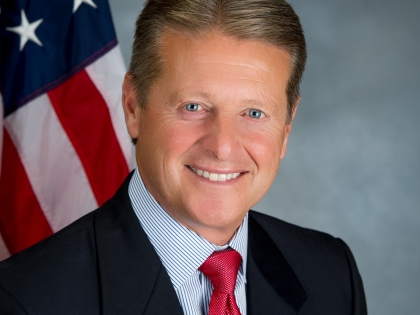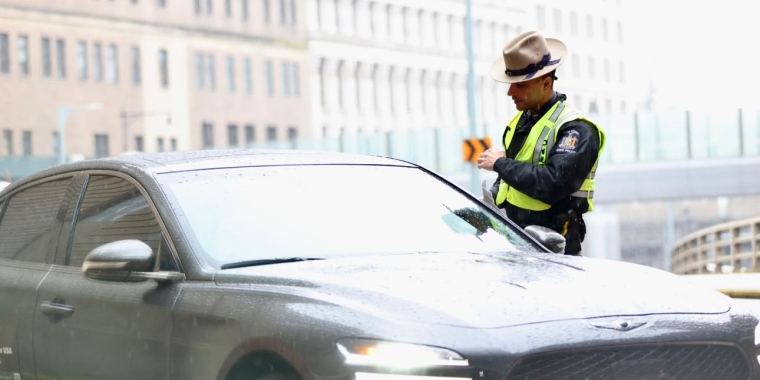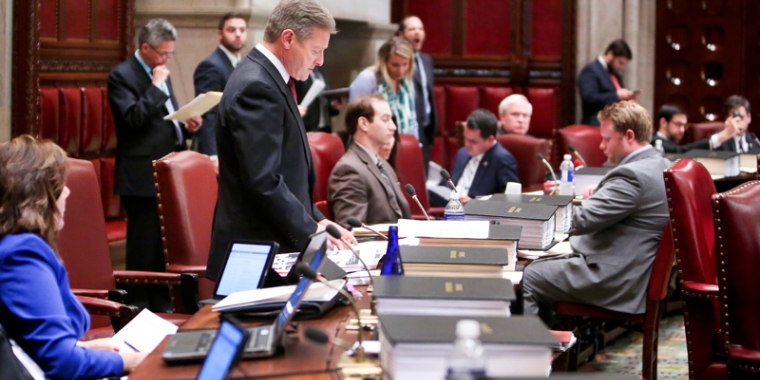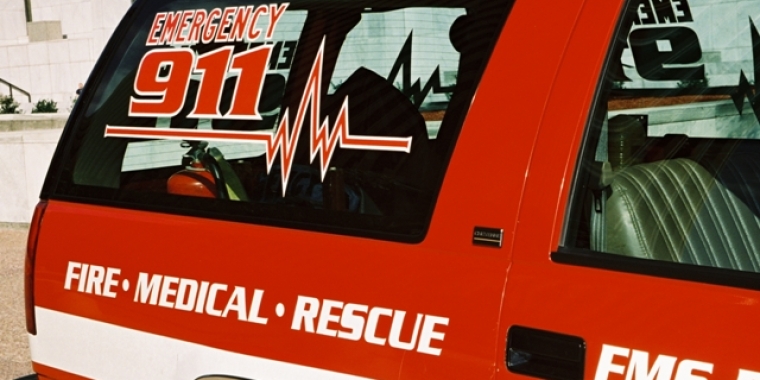
New State Budget Authorizes Upstate Ride Sharing, Protects Public Safety and Increases Aid for Education
Jim Ranney
April 10, 2017
-
ISSUE:
- Budget
- Education
- Public Safety

Senator Patrick M. Gallivan (R-C-I, Elma) says the 2017-18 budget approved by the Legislature keeps within the state’s self-imposed spending cap while incorporating many of the Senate’s top priorities, including: record investments in clean water protection and local schools; the most significant workers’ compensation reform in a decade; enhanced college affordability; and continued tax relief for residents and businesses.
The final budget also includes important initiatives for Western New York and the upstate region, including legislation which will allow for ride sharing services such as Uber and Lyft. The budget also protects public safety by ensuring violent criminals who prey upon our communities are held accountable.
“At long last, ride-sharing companies will be allowed to operate in Buffalo, Rochester and other upstate communities,” Gallivan said. “Services such as Uber and Lyft will create jobs, provide reliable transportation options for residents and visitors and help reduce the number of DWI’s.”
Supporting law enforcement and keeping our communities safe and free from harm have always been among the Senate’s most critical priorities. Gallivan was instrumental in ensuring that the final agreement on criminal justice protects public safety.
“While understanding that 16 and 17 year olds are different from adults, this agreement ensures people who commit violent crimes and jeopardize public safety are held accountable for their actions, and, at the same time, addresses how to reduce recidivism and victimization.”
“The new budget controls the size and cost of government while at the same time helping hardworking, middle class families and businesses by providing much needed tax relief,” Gallivan said. “The spending plan supports economic development, invests in education, supports our vital agriculture industry and provides much needed funding for infrastructure.”
Budget highlights include:
RECORD FUNDING FOR LOCAL SCHOOLS
The enacted budget includes a record level of school aid funding of approximately $26 billion. This is an approximately $1.1 billion increase over last year, equating to 4.4 percent, and continues the growth of education funding at twice the rate of the rest of the budget. New York State’s total commitment to supporting public education, when combined with the STAR school tax relief program, will be approximately $29 billion this year. Education funding highlights include:
- The Senate rejecting the Executive Budget's proposal to eliminate the Foundation Aid phase-in and securing an additional $272 million in Foundation Aid, bringing the year-to-year increase to $700 million and total funding to $17.2 billion -- ensuring that every school district will see an increase in funding of at least 2.74 percent;
- Providing $25 million in Smart School Technology funding and $5 million to support STEM in nonpublic schools
MAKING COLLEGE MORE AFFORDABLE
The budget changes the Governor’s original “free college tuition plan” in a number of smart and responsible ways consistent with what the Senate has advocated for in recent years to help make college more affordable and accessible for more middle class New Yorkers, including:
- Providing a record-high level of Tuition Assistance Program (TAP) funding - more than $1.1 billion this year – and helps more than 25,000 additional students better afford the cost of a college education;
- Adding $19 million for a new Enhanced Tuition Award initiative specifically designed to help students at private colleges and universities;
- Helping public college students participating in the new program by providing up to $5,500 per student, with SUNY and CUNY committing to waive remaining tuition costs if students follow the program’s requirements;
- Creating key measures to promote student responsibility, including minimum GPA standards, steps to enhance on-time graduation, and a requirement that participants live and work in New York after graduation;
- Delivering $3.1 million in tuition assistance for part-time community college students - a step that will help working parents.
To continue supporting New York’s public universities, the budget also:
- Includes new language guaranteeing state support of SUNY and CUNY in future years;
- Launches the largest infrastructure program for SUNY and CUNY campuses in years -- updating and improving campuses across the state; and
- Ensures strong support for community colleges, including a $50 increase per full time equivalent (FTE).
Supporting Fair Wages for Direct Care and Clinical Professionals
After the Senate advocated for funding that was absent from the Executive Budget proposal, the final budget provides a $146 million multi-year boost in wages to compensate direct care and other clinical professionals for the important work they do in caring for our most vulnerable adults. The funding helps appropriately adjust salaries at not-for-profits that employ workers who provide services for individuals with disabilities, as well as staff at not-for-profits under the purview of the Office of Alcohol and Substance Abuse Services and the Office of Mental Health.
The new funding breaks down to $55.5 million in additional wage compensation for direct care staff in the 2017-18 fiscal year, followed by an additional $90 million starting next year that would include clinical staff as well.
PROMOTING ECONOMIC DEVELOPMENT - REFORMING WORKERS’ COMPENSATION
The Senate successfully led the fight for the most significant workers’ compensation reform in a decade. This top Senate budget priority includes sensible reforms that help businesses, local governments, and not-for-profits achieve meaningful savings, while also enhancing the protections in place for injured workers.
The measures will make it more affordable to do business in New York, with employers expected to see savings this year in the form of rebates and hundreds of millions of dollars more in ongoing annual savings on premium costs after reforms are implemented.
The final budget also rejects hundreds of millions of dollars in several onerous taxes and fee increases proposed by Governor Cuomo, including new and increased DMV fees and new taxes on internet purchases.
STRENGTHENING OUR INFRASTRUCTURE
The budget makes a historic investment of $2.5 billion to ensure all New Yorkers have access to clean, safe drinking water. The Senate is leading the charge to ensure the state provides the resources necessary to address extensive water quality issues and infrastructure needs across the state. The final budget includes:
- $1 billion for a new Water Infrastructure Improvement Act of 2017 to fund municipal water infrastructure projects over the next five years;
- Continued funding ($245 million) of the Water Quality Improvement Program grants;
- $150 million for a new intermunicipal water infrastructure grant program to help fund projects that serve multiple municipalities and promote cost savings;
- $100 million in new funding for municipal water quality projects that would not currently qualify for existing state grants;
- $75 million for a new state rebate program to incentivize the replacement of failing septic systems and cesspools;
- $20 million for the replacement of lead pipes, with preferences given to communities with a high percentage of elevated childhood lead blood levels;
- $100 million over five years for the state Superfund program to be used for clean water projects; and $30 million over five years for solid waste and drinking water mitigation and remediation projects;
- $275 million in continued funding for Clean Water and Drinking Water State Revolving Funds;
- $10 million for a new emergency infrastructure loan program to repair breaches of infrastructure that causes an imminent threat to the public health or the environment
The budget continues the state’s record commitment to the protection of natural resources with $300 million for the Environmental Protection Fund (EPF). The EPF helps protect water resources through the preservation of open spaces and upgrading sewage treatment plants, among many other environmental initiatives. To further support clean water projects, $20 million from the EPF will help support existing funding in the Water Quality Improvement Program.
Clean Water Protections
As proposed by the Senate’s Health and Environmental Conservation committees earlier this year, the final budget creates the Emerging Contaminant Monitoring Act to require all public water systems to test for unregulated contaminants identified by the Department of Health that are known, or anticipated to be present in drinking water, including PFOA, PFOS and 1,4-Dioxane. A new Drinking Water Quality Council is also established in the budget after being advocated by the Senate and will bring together experts to review existing evidence, study contaminants of concern, and make recommendations to the Department of Health regarding drinking water safety, including state specific thresholds and public notice procedures.
Increased Support for Transportation Infrastructure
The budget includes significant increases for transportation infrastructure that were successfully advocated for by the Senate. The budget maintains fairness in funding and a more equitable and regionally balanced transportation plan. An increase of nearly $1.7 billion over last year brings the total transportation funding to $29 billion, including $2 billion for the Thruway Authority. The budget includes:
- An approximately $1.5 billion increase this year to accelerate road and bridge projects throughout the state;
- $65 million increase for a total of $503 million this year and $2.4 billion over five years for the Consolidated Local Street and Highway Program (CHIPS), with the additional funding earmarked for Extreme Winter Recovery;
- $50 million increase for the local BRIDGE NY program for a total of $150 million this year and $550 million over five years, including $70 million earmarked for culverts);
- $20 million increase for a total of $104 million this year and $417 million over five years for non-MTA downstate and upstate transit systems capital; and
- $10 million increase for a total of $27 million this year and $292 million over five years for aviation.
In addition, the budget includes:
- $4 million this year in operating aid for rural transit systems;
- continued funding for the local PAVE NY program to help fix New York’s roads (total: $100 million this year; $500 million over five years); and
- $352 million for rail freight over five years.
CONTINUING AND EXPANDING TAX RELIEF FOR NEW YORKERS
This year, more than $3.15 billion will be used to fund New York’s STAR and Enhanced STAR property tax programs, and changes were made to ensure the state’s STAR payments to taxpayers are made on time. To date, STAR and Enhanced STAR have delivered significant tax relief to millions of middle-class families and senior citizens statewide.
The Senate succeeded in blocking an Executive Budget proposal to cap the amount of savings property owners receive for STAR at this current year’s levels. As a result, the final budget saves local taxpayers an estimated $50 million this year and nearly $700 million over five years.
Delivering Another Round of Rebate Checks to Property Taxpayers
The 2017-18 State Budget fully funds another installment of property tax rebate checks, providing millions of homeowners with $453 million in direct, much-needed tax relief through a check in the mail. When combined with the STAR and Enhanced STAR programs, these checks will bring total property tax relief in this year’s budget to $3.6 billion.
New Tax Relief for Working Parents
The budget includes $47 million in additional tax relief for working families’ child care expenses. The state’s Child and Dependent Care Tax Credit is expanded for taxpayers with incomes between $50,000 and $150,000 and the current cap on child care expenses would rise from $6,000 to a maximum of $9,000 (depending on the number of children) for families with up to five children.
Protecting the Middle Class Tax Cut
The Senate ensured that the Middle Class Income Tax Cut created by the Senate last year remained untouched in this budget. By 2025 when the tax cut is fully phased in, it will bring tax rates down to the lowest rate since 1948 -- provide an average savings to individuals and tens of thousands of small businesses of $700 per taxpayer per year, for an annual total savings of $4.2 billion.
PLANNING FOR NEW YORK’S ECONOMIC FUTURE
The enacted budget includes record funding of more than $15 million for dozens of job training and workforce development initiatives, nearly all of which were advocated for by the Senate’s Task Force on Workforce Development. Senator Gallivan also successfully advocated for apprenticeship programs to connect unemployed young adults with small and medium sized businesses struggling to fill middle-skill position.
Highlights include:
- Nearly $4 million for Workforce Development Institute (WDI) – a highly successful not-for-profit that works with businesses and the AFL-CIO to provide focused training of workers and for workforce transition support to help stop the outsourcing of jobs to other states.
- $3 million for WDI’s Manufacturing Initiative;
- $980,000 for the Chamber of Commerce On-the-Job Training Program;
- $600,000 for Building Trades Pre-Apprenticeship Programs
Growing New York’s Agriculture From The Ground Up
Once again, the Senate succeeded in restoring nearly $10 million (for a total of $51 million) to fund initiatives not included in the Executive Budget that will give New York farmers a leading edge over other states to continue growing our agriculture industry. Dozens of programs - investments in cutting-edge agricultural research, support for the next generation of family farmers, environmental stewardship, and protections for plant, animal, and public health – will be funded, with significant increases including:
- $1.5 million (for a total of $1.9 million) for the Farm Viability Institute to help New York’s farmers become more profitable and to improve the long-term economic viability and sustainability of farms, the food system, and the communities which they serve;
- $1 million (for a total of $9.3 million) for Agri Business Child Development, to provide quality early childhood education and social services to farm workers and other eligible families;
- $1 million (for a total of $5.4 million) for the Cornell Diagnostic Lab;
- $516,000 (for a total of $1.2 million) for FarmNet, Farm Family Assistance; and
- $300,000 (for a total of $842,000) to expand FFA and help prepare young New Yorkers to become leaders in agriculture.
Helping the Hungry Through Farming
The Senate succeeded in including “Farm-to-Food-Bank” in the final budget after last year's legislation was vetoed. More fresh, New York-grown produce will be available to help feed the hungry by allowing farmers to claim a tax credit for produce and other farm product donations to food banks or other emergency food programs.
PROTECTING NEW YORKERS’ HEALTH AND SAFETY
Record Levels of Funding to Fight Heroin and Opioid Addiction
This year, the Senate’s Joint Task Force on Heroin and Opioid Addiction is continuing its work addressing the drug epidemic by securing $214 million in this year’s budget – a record-high level of funding. This will be used to strengthen prevention, treatment, recovery and education services across the state.
Helping Our Veterans:
The State Budget for 2017-18 reflects the Senate Republican Conference’s unwavering support for the heroic service men and women who have sacrificed so much on behalf of our nation. Veterans-related budget increases include:
- $1 million in new funding for veteran-to-veteran support services run by Veterans Service Organizations;
- $310,000 (total: $3.1 million) for the Joseph P. Dwyer Veteran Peer-to-Peer Program;
- $250,000 increase (total: $500,000) for the Veterans Outreach Center in Monroe County;
- $120,000 in new funding for Veterans of Foreign Wars NYS Chapter Field Service Operations; and
- $10,000 (total: $50,000) for the Vietnam Veterans of America New York State Council.
Other programs receiving funding include:
- $500,000 for the NYS Defenders Association Veterans Defense Program;
- $200,000 for Legal Services of the Hudson Valley Veterans and Military Families Advocacy Project;
- $200,000 for Warrior Salute;
- $100,000 for the Veterans Justice Project;
- $100,000 for the SAGE Veterans Project;
- $200,000 for Helmets-to-Hardhats; and
- $25,000 for the Veterans Miracle Center.
Creating Healthier Communities
The budget includes $500 million for the Health Care Facility Transformation Program to support capital improvements at hospitals, other health care facilities and community-based providers, and provides an opportunity for increased eligibility throughout the state. In addition, the budget includes:
- $24 million for cancer services;
- $12 million for chronic disease prevention (including diabetes, asthma, and hypertension);
- $26 million for Nutritional Information for Women, Infants and Children;
- $27 million for maternal and child health programs, and also includes language to provide Medicaid coverage for donor breast milk to help prevent deadly complications faced by premature infants in neonatal ICUs;
- $475,000 for women’s health initiatives;
- $400,000 for funding to address Lyme and other tick-borne diseases through research, education, and prevention efforts;
- $283,000 for the Adelphi Breast Cancer Support Program;
- $8.5 million in additional funding of the Spinal Cord Injury Research Board;
- $9 million for the Doctors Across New York Program; and
- $1.3 million to support organ donation.
Supporting Seniors
The budget boosts support for a wide array of programs and initiatives that serve seniors, including funding for the following:
- $31 million for Community Services for the Elderly Program;
- $27 million for the Wellness in Nutrition Program;
- $27 million for Alzheimer’s and other dementia related programs;
- $1.2 million for elder abuse prevention initiatives to protect vulnerable senior citizens from abuse;
- $250,000 for Older Adults Technology Services;
- $86,000 for the New York Foundation for Seniors Home Sharing and Respite; and
- $32,000 for the Senior Action Council Hotline.
Despite the efforts of Senator Gallivan and other members of the WNY Legislature Delegation, the budget does not include language to prevent the Western New York Children’s Psychiatric Center in West Seneca from merging with the Buffalo Psychiatric Center.
“I am profoundly disappointed that we could not convince the Office of Mental Health that merging the Children’s Psychiatric Center with the Buffalo facility is a terrible idea,” Gallivan said. “There is no clinical reason for this move and I will continue to fight to stop this shortsighted and ill-advised plan.”
Senator Gallivan introduced legislation, which would have required WNYCPC be maintained in Erie County as a separate and distinct entity, both organizationally and physically.
-30-
Share this Article or Press Release
Newsroom
Go to NewsroomWhat To Do When Stopped by Police
September 24, 2024

Senator Gallivan Urges PSC to Reject National Grid's Rate Hike Request
September 23, 2024


